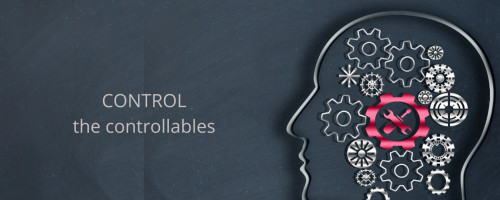
Control the Controllables
I recently finished reading “The Art of Resilience” by Ross Edgley. Edgley was the first and only person to swim around the UK. This is just one of his many incredible feats. Others include completing a marathon pulling a 1,400kg car and completing a rope climb of 8,848 metres (the height of Mount Everest) in 19 hours and 54 minutes. In his book, Edgley discusses the importance of physical training to prepare for such events, but the focus is on the mental preparedness and toughness required to achieve what many considered impossible. The key message that I took from the book was that in order to build resilience we need to control the controllables and accept the uncontrollables. However, I believe that this relates to more than just resilience; applying this principle to everyday life keeps us accountable and acknowledges that we are responsible for two things: our thoughts and our actions.
If we can learn to control the controllables, we must also learn to accept the uncontrollables. We cannot control the actions of others, the weather, the results of our favourite sports team or when Macau opens its borders. We need to accept that these are out of our control i.e. the uncontrollables. So, as part of the school community, what can we control? We (students and staff) are responsible for:
Attending school regularly (in his swim around the UK, Ross Edgley took 0 days off, swimming approximately 12 hours a day)
Being punctual (there is a famous quote “early is on time, on time is late, and late is unacceptable”)
Following the code of conduct. At TIS we strive for excellence, we are responsible for our actions and we should be held to high expectations.
Communicating. Of course, with all of the above, certain uncontrollables can impact them. Communication is key to allowing others to understand why or how we have not met expectations. As humans, we will make mistakes, but what’s most important is that we learn from these mistakes and move forward with a positive mindset and don’t let mistakes repeat themselves.
I discussed Edgley’s accomplishments at a recent Middle School assembly. At the previous assembly, I introduced the VIA character strengths to students and encouraged them to take the character strength tests to see where their strengths lie. There are 24 character strengths in total but I would like to focus on 3:
Honesty - “I persist towards my goals depicts obstacles, discouragements, or disappointments”
Perseverance - “I am honest to myself and others, I try to present myself and my reactions accurately to each person, and I take responsibility for my actions.
Self-Regulation - “I manage my feelings and actions and am disciplined and self-controlled”
These 3 character strengths are closely related to resilience and one’s ability to control the controllables.
Sure, there may be traffic on our way to school. Can we leave the house earlier? Walk to school? Ride a bike? Make our own breakfast instead of waiting in a queue at Starbucks?
We may wake up not feeling 100%. Can we get to bed earlier? Exercise more? Spend less time on our devices? Drink more water?
We may cave into peer pressure and do something because somebody else did it. Are we following the correct example? How will we learn from our mistakes? Does this make it right?
If we can answer the above questions, and be true to ourselves, we are on the path to becoming more resilient by holding ourselves accountable for our actions. Perhaps those around us will start following our example.
Finally, why should we improve our resilience? Well, the Journal of Personality and Social Psychology found that resilience was a much stronger predictor of success than IQ. Therefore, if we want to be successful in life (who doesn’t?), not giving our consent for the controllables to be conquered may hold the key.
Control the controllables, accept the uncontrollables.



